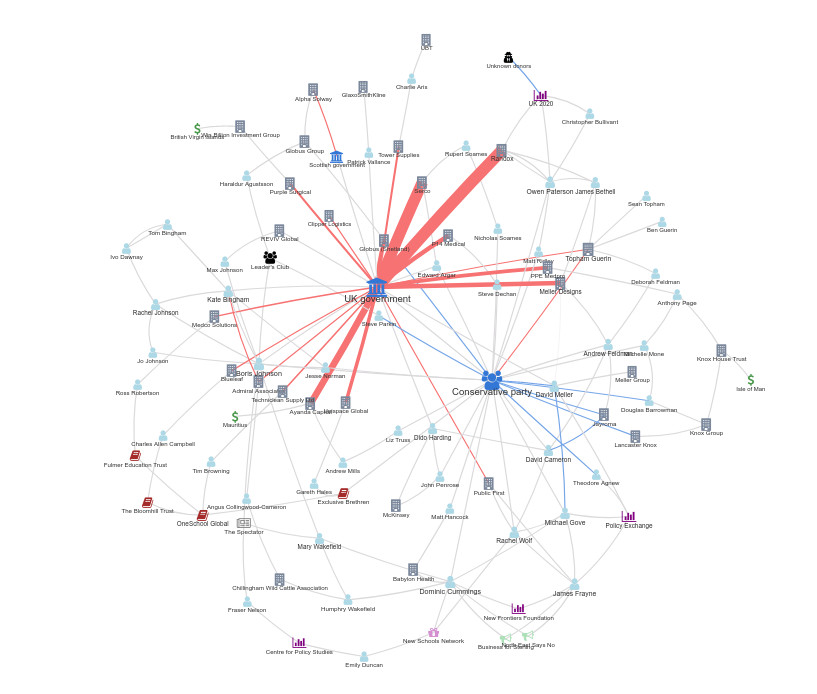
Today's Twitter threads (a Twitter thread).
Inside: Boundless Realms; Student data breaches vastly underreported; UK corporate registrar bans code-injection; Someone Comes to Town Part 22; and more!
Archived at: pluralistic.net/2020/11/09/bou…
#Pluralistic
1/
Inside: Boundless Realms; Student data breaches vastly underreported; UK corporate registrar bans code-injection; Someone Comes to Town Part 22; and more!
Archived at: pluralistic.net/2020/11/09/bou…
#Pluralistic
1/

I'm giving a talk today at the Reboot Conference at 12PM Pacific:
How to Fix the Internet
rebootconference.org/day-two
2/
How to Fix the Internet
rebootconference.org/day-two
2/

Boundless Realms: The definitive guide to the Haunted Mansion.
3/
https://twitter.com/doctorow/status/1325538536376860672
3/

Student data breaches vastly underreported: When monopolism meets ed-tech.
4/
https://twitter.com/doctorow/status/1325829432293036033
4/

UK corporate registrar bans code-injection: But you can still register +++ATH, Inc.
5/
https://twitter.com/doctorow/status/1325833016015400960
5/

Someone Comes to Town Part 22: My latest podcast episode.
6/
https://twitter.com/doctorow/status/1325834335044341762
6/

#15yrsago Sony’s EULA is worse than their rootkit web.archive.org/web/2005111313…
#15yrsago List of CDs infected with Sony’s rootkit DRM eff.org/deeplinks/2005…
#10yrsago RIP, Robbins Barstow, godfather of the home movie revival amateurism.wordpress.com/2010/11/09/rob…
7/
#15yrsago List of CDs infected with Sony’s rootkit DRM eff.org/deeplinks/2005…
#10yrsago RIP, Robbins Barstow, godfather of the home movie revival amateurism.wordpress.com/2010/11/09/rob…
7/

#5yrsago Chelsea Manning’s statement for Aaron Swartz Day 2015 aaronswartzday.org/chelsea-mannin…
8/
8/

Yesterday's threads: Villainry revealed by Monty Python Latin; and more!
9/
https://twitter.com/doctorow/status/1325493459059318784
9/

My latest novel is Attack Surface, a sequel to my bestselling Little Brother books. @washingtonpost called it "a political cyberthriller, vigorous, bold and savvy about the limits of revolution and resistance."
Get signed books from @darkdel: darkdel.com/store/p1840/Av…
10/
Get signed books from @darkdel: darkdel.com/store/p1840/Av…
10/
I have a (free) new book out! "How to Destroy Surveillance Capitalism" is an anti-monopolist critique of Big Tech that connects the rise of conspiratorial thinking to the rise of tech monopolies and proposes a way to deal with both:
onezero.medium.com/how-to-destroy…
11/
onezero.medium.com/how-to-destroy…
11/
My ebooks and audiobooks (from @torbooks, @HoZ_Books, @mcsweeneys, and others) are for sale all over the net, but I sell 'em too, and when you buy 'em from me, I earn twice as much and you get books with no DRM and no license "agreements."
craphound.com/shop/
12/
craphound.com/shop/
12/

Upcoming appearances:
* How to Fix the Internet/Reboot 2020, Nov 9, rebootconference.org/day-two
* Cyberterrorists, Post-Apocalyptic Landscapes, and Were-Pomeranians/Texas Book Festival, Nov 12, texasbookfestival.org/events/cyberte…
13/
* How to Fix the Internet/Reboot 2020, Nov 9, rebootconference.org/day-two
* Cyberterrorists, Post-Apocalyptic Landscapes, and Were-Pomeranians/Texas Book Festival, Nov 12, texasbookfestival.org/events/cyberte…
13/

Recent appearances:
* Author Stories Podcast
* The Gould Standard:
glenngould.ca/thegouldstanda…
* Attack Surface: A Reckoning
draxfiles.com/2020/10/26/sho…
14/
* Author Stories Podcast
* The Gould Standard:
glenngould.ca/thegouldstanda…
* Attack Surface: A Reckoning
draxfiles.com/2020/10/26/sho…
14/

My first picture book is out! It's called Poesy the Monster Slayer and it's an epic tale of bedtime-refusal, toy-hacking and monster-hunting, illustrated by Matt Rockefeller. It's the monster book I dreamt of reading to my own daughter.
pluralistic.net/2020/07/14/poe…
15/
pluralistic.net/2020/07/14/poe…
15/

You can also follow these posts as a daily blog at pluralistic.net: no ads, trackers, or data-collection!
Here's today's edition: pluralistic.net/2020/11/09/bou…
16/
Here's today's edition: pluralistic.net/2020/11/09/bou…
16/
If you prefer a newsletter, subscribe to the plura-list, which is also ad- and tracker-free, and is utterly unadorned save a single daily emoji. Today's is "⛅️". Suggestions solicited for future emojis!
Subscribe here: pluralistic.net/plura-list
17/
Subscribe here: pluralistic.net/plura-list
17/
Are you trying to wean yourself off Big Tech? Follow these threads on the #fediverse at @pluralistic@mamot.fr.
Here's today's edition: mamot.fr/@pluralistic/1…
18/
Here's today's edition: mamot.fr/@pluralistic/1…
18/
• • •
Missing some Tweet in this thread? You can try to
force a refresh












